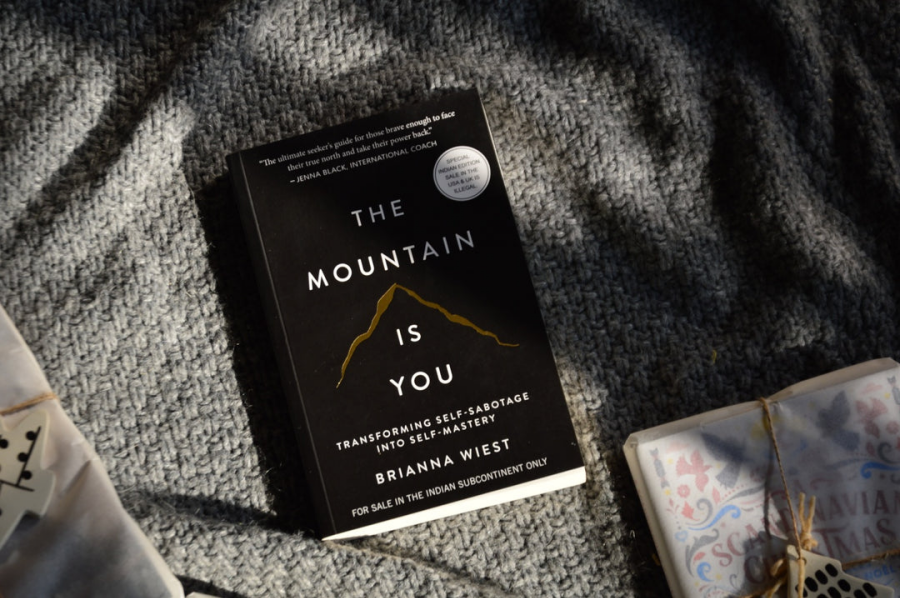

Have you ever felt like you're your own worst enemy? Like there's an invisible force holding you back from achieving your dreams? Welcome to the club. We've all been there, struggling with self-sabotage and wondering why we can't seem to get out of our own way. But what if I told you that the very obstacles you're facing are actually stepping stones to your greatest transformation?
Enter "The Mountain Is You" by Brianna Wiest, a book that's been creating waves in the self-help world. This isn't your average personal development read – it's a guidebook for scaling the most challenging peak of all: yourself. Today, we're diving deep into 10 game-changing lessons from this book that could revolutionize your journey to self-mastery.
Buckle up, fellow climbers. It's time to conquer your inner Everest.
1. The Art of Identifying Your Self-Sabotage Patterns
Picture this: You're about to embark on an exciting new project, but suddenly you find yourself binge-watching your favorite show instead. Sound familiar? That's self-sabotage in action.
Wiest teaches us that the first step to overcoming self-sabotage is recognizing it. These behaviors aren't always obvious – they can be as subtle as constantly checking your phone when you should be working, or as drastic as sabotaging a promising relationship.
Thing to do: For the next week, keep a "self-sabotage journal." Jot down moments when you feel you're hindering your own progress. Look for patterns. Are there specific situations or emotions that trigger these behaviors?
2. Embracing the Uncomfortable Truth: You Are Your Own Mountain
Here's a mind-bender for you: the obstacles you face aren't external – they're you. Wiest argues that we often create our own barriers as a form of self-protection. It's a paradox, really. We sabotage ourselves to avoid the very success we crave.
This realization can be uncomfortable, but it's also empowering. If you're the mountain, you're also the climber. You have the power to reshape your landscape.
Reflection question: What "mountains" have you created in your life? How might these obstacles actually be attempts at self-protection?
3. The Power of Emotional Archaeology
Imagine you're an archaeologist, but instead of digging for ancient artifacts, you're excavating your emotional landscape. That's the essence of this lesson.
Wiest encourages us to dig deep into our past experiences and beliefs to understand the roots of our self-sabotaging behaviors. Maybe you procrastinate because you fear success will change your relationships. Or perhaps you avoid intimacy because of past heartbreaks.
Conditioning: Choose a self-sabotaging behavior you'd like to change. Now, grab a shovel (metaphorically, of course) and start digging. What past experiences or beliefs might be fueling this behavior?
4. Rewriting Your Inner Narrative: From Self-Saboteur to Self-Master
We all have an inner storyteller, constantly narrating our lives. But what if that narrator is stuck in a negative loop? Wiest emphasizes the importance of becoming aware of our internal dialogue and actively rewriting it.
For instance, instead of "I always mess things up," try "I'm learning and growing with each experience." It's not about positive thinking – it's about accurate thinking.
Hurdle: For the next 24 hours, pay close attention to your inner dialogue. Each time you catch a negative thought, pause and reframe it in a more balanced, compassionate way.
5. The Counterintuitive Approach: Befriending Your Fear
Fear is often seen as the enemy of progress. But what if we could turn fear into an ally? Wiest suggests that instead of trying to eliminate fear, we should learn to work with it.
Fear can be a compass, pointing us towards areas of potential growth. When you feel afraid, ask yourself: What is this fear trying to teach me? What opportunity for growth lies on the other side of this fear?
Experiment: Choose a fear you've been avoiding. Instead of running from it, get curious about it. What might this fear be protecting you from? What could you gain by facing it?
6. The Mindfulness Revolution: Present Moment as a Portal to Change
In our fast-paced world, it's easy to get caught up in regrets about the past or anxiety about the future. But Wiest reminds us that the only moment we have true power is the present.
Practicing mindfulness – the art of being fully present – can break the cycle of self-sabotage by bringing awareness to our thoughts and actions in real-time.
Daily practice: Set three random alarms on your phone each day. When they go off, take a minute to ground yourself in the present moment. What do you see, hear, feel, smell, and taste right now?
7. The Alchemy of Emotions: Transforming Pain into Power
Emotions aren't good or bad – they're information. Wiest teaches us to see our emotions, even the painful ones, as messengers carrying important insights about our needs and values.
By learning to sit with our emotions, understand them, and respond to them wisely, we can transform emotional pain into a catalyst for growth and change.
Activity: Next time you experience a strong emotion, especially a negative one, resist the urge to push it away. Instead, get curious. What is this emotion trying to tell you? What need is it pointing to?
8. The Paradox of Boundaries: Limiting to Expand
Setting boundaries might seem like it's about saying "no" and limiting yourself. But Wiest shows us that healthy boundaries actually create the space we need to grow and thrive.
By clearly defining what's acceptable and what's not, we protect our energy and focus on what truly matters to us.
Provoke: Identify one area of your life where you need stronger boundaries. This week, practice setting and enforcing a new boundary in this area. Notice how it affects your energy and focus.
9. The Wisdom of Imperfect Action: Progress Over Perfection
Perfectionism is often self-sabotage in disguise. Wiest encourages us to embrace "imperfect action" – taking steps forward even when conditions aren't ideal and we don't feel fully ready.
Remember, a wobbly step forward is still progress. The mountain isn't climbed in one giant leap, but through many small, often messy steps.
Initiative: Choose a goal you've been putting off because conditions aren't "perfect." Now, commit to taking one small, imperfect action towards this goal every day for the next week.
10. The Ultimate Climb: Self-Compassion as the Path to Self-Mastery
Perhaps the most crucial lesson from "The Mountain Is You" is the power of self-compassion. Wiest argues that true self-mastery isn't about harsh self-discipline, but about treating ourselves with the same kindness and understanding we'd offer a good friend.
When we stumble (and we will – we're human, after all), self-compassion gives us the resilience to get back up and keep climbing.
Everyday drill: Each night before bed, write down three things you appreciate about yourself or three ways you showed yourself compassion that day.
Conclusion:
As we reach the summit of our exploration, take a moment to look back at how far you've come. Each of these lessons is a tool in your backpack, ready to support you as you continue your climb towards self-mastery.
Remember, transforming self-sabotage into self-mastery isn't a destination – it's a lifelong journey. There will be steep cliffs and challenging terrains. But with each step, each lesson applied, you're not just climbing a mountain – you're becoming the mountain. Strong, resilient, and capable of weathering any storm.
So, fellow climber, which of these lessons resonates most with you? What's your next step on this journey of self-mastery? Share your thoughts in the comments below. Let's create a community of support as we each tackle our inner Everest.
Keep climbing, keep growing, and remember – the view from the top is worth every step of the journey.



